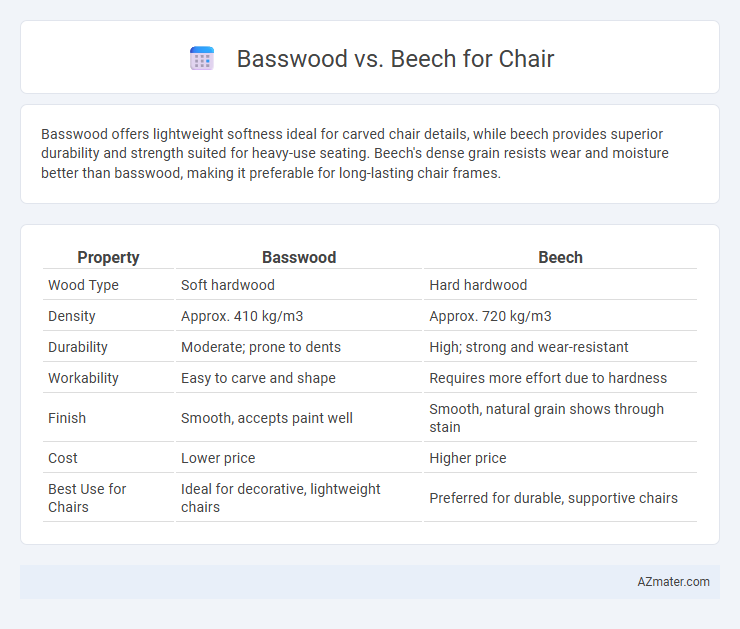Basswood offers lightweight softness ideal for carved chair details, while beech provides superior durability and strength suited for heavy-use seating. Beech's dense grain resists wear and moisture better than basswood, making it preferable for long-lasting chair frames.
Table of Comparison
| Property | Basswood | Beech |
|---|---|---|
| Wood Type | Soft hardwood | Hard hardwood |
| Density | Approx. 410 kg/m3 | Approx. 720 kg/m3 |
| Durability | Moderate; prone to dents | High; strong and wear-resistant |
| Workability | Easy to carve and shape | Requires more effort due to hardness |
| Finish | Smooth, accepts paint well | Smooth, natural grain shows through stain |
| Cost | Lower price | Higher price |
| Best Use for Chairs | Ideal for decorative, lightweight chairs | Preferred for durable, supportive chairs |
Introduction: Comparing Basswood and Beech for Chairs
Basswood and beech are popular hardwood choices for chair construction, valued for their durability and workability. Basswood is lightweight with a fine, even grain, making it easy to carve and ideal for intricate designs. Beech offers superior strength and a tight, uniform grain that enhances chair stability and longevity.
Wood Characteristics: Basswood vs Beech
Basswood is lightweight, soft, and has fine, even texture with a pale cream color, making it easy to carve and ideal for intricate chair designs. Beech wood is dense, hard, and durable with a tight grain and a warm reddish-brown hue, providing excellent strength and resistance to wear in chair construction. The choice between basswood and beech depends on the desired balance of workability versus structural durability for the chair.
Strength and Durability Comparison
Basswood offers moderate strength and lightweight properties, making it suitable for chair components that require easy shaping but less structural load. Beech wood exhibits superior strength and durability, providing excellent resistance to wear and heavy use, ideal for chair frames and legs. The dense grain and hardness of beech ensure long-lasting support and stability compared to the softer and more flexible basswood.
Workability and Machining Ease
Basswood offers excellent workability and machining ease due to its soft, fine-grained texture, making it ideal for intricate chair designs and detailed carving. Beech, while harder and denser than basswood, machines well with sharp tools, providing smooth finishes but requiring more effort and precision during cutting and shaping. Both woods are favored in chair-making, but basswood is preferred for intricate joinery and hand-carving, whereas beech is chosen for durability and resistance to wear.
Weight and Density Differences
Basswood is significantly lighter with a density around 0.32-0.44 g/cm3, making it easier to handle and ideal for lightweight chair designs. Beech, with a higher density of approximately 0.72-0.83 g/cm3, offers greater weight and strength, enhancing durability and stability in chair construction. The substantial weight difference influences the chair's portability and the feel of sturdiness under use.
Finishing and Aesthetic Qualities
Basswood offers a smooth, fine grain that accepts paint and stains uniformly, making it ideal for varied finishing techniques in chair crafting, while beech features a tighter, more pronounced grain that enhances natural wood stains and oil finishes. The pale, creamy tone of basswood provides a clean, contemporary look, whereas beech's warmer, reddish hue adds richness and traditional charm to furniture aesthetics. Both woods exhibit excellent durability for chair use, but the finishing choice heavily influences the final visual appeal and style compatibility.
Cost and Availability
Basswood is generally more affordable than Beech, making it a cost-effective choice for chair manufacturing. Beech is widely available but often commands a higher price due to its durability and aesthetic appeal. Both woods are commonly sourced in North America and Europe, with Basswood easier to find in bulk for budget-conscious projects.
Suitability for Indoor and Outdoor Use
Basswood features a fine, even grain and moderate hardness, making it ideal for indoor chairs where a smooth finish and resistance to denting is preferred. Beech boasts higher density and strength, providing better durability and moisture resistance, suitable for semi-outdoor chairs in covered areas. For prolonged outdoor exposure, neither wood excels without protective coatings, but beech's natural toughness offers superior performance over basswood in humid conditions.
Maintenance and Longevity
Basswood offers low maintenance due to its soft texture and resistance to warping, making it easy to clean and ideal for casual use, while Beech is denser and harder, requiring more care to prevent scratches but providing greater durability and longevity in high-traffic settings. Beech's natural hardness allows it to withstand heavy weight and frequent use, often lasting decades with proper maintenance, whereas Basswood may dent more easily and show wear faster over time. Choosing Beech chair frames ensures extended lifespan and resilience, whereas Basswood suits lightweight, low-impact furniture needing minimal upkeep.
Which Wood is Best for Your Chair?
Basswood offers a lightweight, fine-grained texture ideal for detailed carving and provides a smooth finish, making it perfect for decorative chairs. Beech is denser and stronger, offering excellent durability and wear resistance suitable for sturdy, high-traffic seating. Choosing between basswood and beech depends on whether you prioritize intricate design and lightness or toughness and long-term resilience for your chair.

Infographic: Basswood vs Beech for Chair
 azmater.com
azmater.com